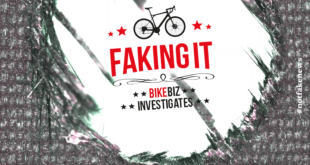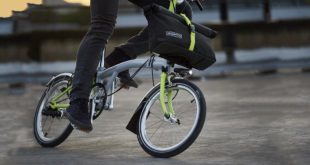The City of London Police’s Intellectual Property Crime Unit – PIPCU – has launched an awareness campaign which warns that "there’s more at stake when it’s a fake." Buy a Chinarello or a pair of Foakleys and you’re more at risk of identity fraud, warns the police IP unit.
Bike companies are among thousands to be impacted by the selling of fake items, as recounted in the 20-part series of "Faking It" articles on BikeBiz.
Out of the 28,000 UK-facing websites taken down since 2014, there were over 4,000 which sold counterfeits registered using stolen British identities.
PIPCU’s campaign highlights the many consequences of buying counterfeit goods online, especially identity crime. When buying items, people will part with personal details such as their address and financial information which allows fraudsters to set-up new websites selling counterfeit goods in their name, say the police.
Action Fraud, the national fraud and cyber reporting centre, hosted by the City of London Police, received over 15,000 reports linked to identity crime between April 2016 and March 2017).
400 victims have been contacted by PIPCU in the last two years to inform them that their identity is believed to have been stolen and open websites in their name after they had previously purchased counterfeit items online.
PIPCU is also urging online shoppers to be aware that counterfeit goods are often made using cheap materials that can pose a public safety threat. Not only are cheap and inferior items less effective but they also increase the risk of injury as counterfeits aren’t subjected to the vigorous safety checks that genuine items are.
In 2016/17 the Intellectual Property Office (IPO) reported that two million infringing items were detained at UK borders.
Generic stock images are also frequently used to trick consumers into believing they are buying genuine items and websites selling fake goods are increasingly looking more ‘authentic’ in their design, warns PIPCU.
Throughout the new campaign, PIPCU will be sending out messages on social media using the hashtag #MoreAtStake, and issuing tips for safe online shopping:
- Trust your instincts – if an offer looks too good to be true, then it probably is. Do not rush and be fooled into believing you are getting a good deal.
- Check the spelling and grammar on the website and of the URL as often the people behind these sites will try to deceive you by slightly changing the spelling of a well-known brand or shop in the website address.
- Look to see where the trader is based and whether they provide a postal address – just because the web address has ‘uk’ do not assume the seller is based in the UK. If there is no address supplied or there is just a PO Box or email, be wary.
- Only deal with reputable sellers and only use sites you know or ones that have been recommended to you. If you have not bought from the seller before, do your research and check online reviews. People will often turn to forums and blogs to warn others of fake sites.
- Ensure the website address begins ‘https’ at the payment stage – this indicates a secure payment site.
- Keep your security software and firewalls up-to-date.
- Ask the trader if there is a returns policy or guarantee. Most rogue traders will not offer this.
- Watch out for pop-ups appearing asking you to confirm your card details before you are on the payment stage. Never enter your PIN online.
Director of Copyright and Enforcement at the Intellectual Property Office Ros Lynch said:
“The sale of fake goods online is a challenging area. Consumers are often unaware that they are purchasing fake products and that the websites they are using might not be secure. It’s vital that we help them understand the risks so they can stay safe.
“Great progress has been made over the last two years, taking down websites and cutting the opportunities for consumers to be misled. However there is still more to do and the most effective way to deliver this is by PIPCU, government departments and industry working together.”
The 20-article series of "Faking It" articles on BikeBiz.com is available as a PDF, Word document, and Kindle file as well as individual website articles.
 BikeBiz Bicycle and cycling retail news
BikeBiz Bicycle and cycling retail news




